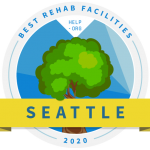Transforming Mental Health with Culturally Competent, Holistic Care
By Yoon Joo Han, ACRS Behavior Health Director
Many people feel uncomfortable talking about mental health. For many of us from Asian Pacific Islander backgrounds, the topic of mental health or mental illness is taboo. Many of us feel ashamed if we have a mental health problem. This stigma has been passed down for generations in our cultures and prevents people from seeking help, which has been proven to be effective.
Bottom line: If you have a brain, you have mental health, just like you have a body, you have physical health. Mental disorders are very common, with over a third of people in most countries reporting a diagnosable mental health issue at some point in their life.
What is physical health? Physical health is a state of well-being when all internal and external body parts, organs, tissues, and cells can function properly. What is mental health? It’s a state of well-being when a person thinks, feels, and acts properly. It’s how we look at ourselves, our lives, other people in our lives, our problems, and evaluate our choices.
When we have good mental health, we think logically, feel positive, and act appropriately. At times, we get a mental health “flu” or “cold” when we may not think logically, feel sad or negative, or act irrationally, but we get better in a couple of weeks. Like serious physical health problems, such as diabetes or cancer, some of us are struck by severe mental health problems which can seriously interfere with our life and cause distress and challenges in handling daily activities, responsibilities, and relationships.
The key to effective mental health treatment is understanding being human as a “holistic being of mind, body, and spirit.” Many factors affect who we are: biological, psychological, social, environmental, cultural, and spiritual, in addition to experiences such as trauma. Only when we understand the underlying complicated causes of mental health issues can we develop the best interventions. Those interventions may include counseling, case management, medication, traditional ritual, acupuncture, primary care service, dental service, recovery group, exercise, healthy cooking, health education, supported employment, housing service, peer service, wellness, or day activities to name a few.
Through our integrative approach at ACRS to mind and physical health, clients are showing positive and significantly improved health indicators: 43% in blood pressure, 47% in BMI, 45% in diabetes, and 46% in cholesterol. Among clients, 35% report feeling healthier, 42% report better functioning in everyday life, 80% report less psychological distress, and 78% report improved social connectedness after participating in the Wellness for Asian Pacific Americans (WAPA) project.
Our Behavioral Health service at ACRS has three important principles we incorporate into all of our services to make treatment effective: whole person/whole health, cultural competence, and recovery. We know the connection between mind and body, movement and brain, social connectedness and health, and the impact of social determinants of health in overall wellbeing. Our mental health program has transformed into a whole health program, addressing not only mental health but physical, social, civic, financial, and cognitive health. We’ve implemented integrated physical and behavioral health services and have seen as our clients get physically healthy, they report improved mental health. And as they connect with others, they report less psychological distress. As they get jobs and find work, their lives are transformed.
All of our services are designed and delivered in a culturally relevant and competent manner. Our bilingual and bicultural staff incorporates eastern and western approaches with our clients’ cultural practices, dance, songs, food, relationships, and ethnic resources into their service design. They also build a rapport and allow clients to effectively communicate and address their whole health understanding, view of themselves, and the world. We know cultural competence improves access and retention, produces positive outcomes, and saves costs for the system.
Our conviction is recovery is possible, and despite mental illness, clients can live healthy, happy, and productive lives in the community. The most important aspect of our job is to find hope for clients with this conviction and to deliver our services with respect and compassion. Our behavioral health staff has become mental health counselors and case managers, as well as also cultural brokers, interpreters, consultants, health educators, lifestyle coaches, liaisons, mentors, care coordinators, and advocates. Our staff members instill hope and help clients find their voice.
One of ACRS’ peer specialists shared the journey of his recovery at our annual gala last year. He was “born again” because of the “beautiful people at ACRS” who helped him find hope and treated him with care and support. He knows ACRS helped him with compassionate, culturally competent, and whole-person care to lead a meaningful life he’s never dreamt of. We are proud to say he’s one of the thousands of stories clients are creating for themselves every day.






